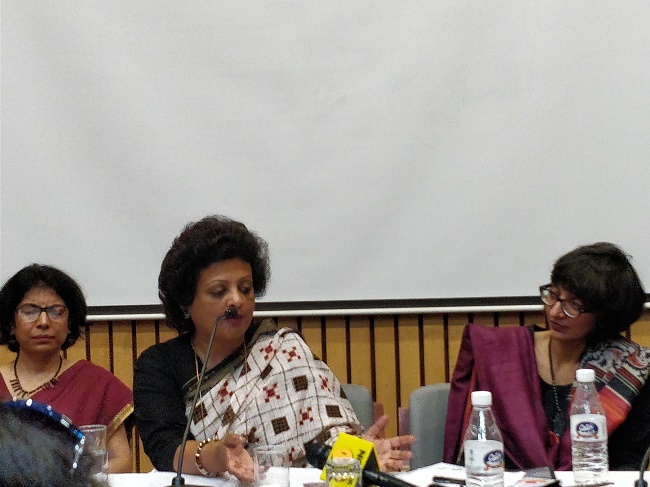Categories
Senior Advocate Rebecca John on ‘How to humanize rape trials?’
Rape trial in courtrooms can be rather intimidating for the survivors. The questioning and allegations can take a serious toll on the survivor’s already vulnerable mental state. But what does it take to humanize a rape trial and make survivors walk out the courts with replenished self-esteem and their head held high?
An NGO Partners for Law in Development (PLD) held a meeting on Friday in New Delhi to discuss and release their report titled ‘Towards victim-friendly responses to rape prosecutions’. It is a study of pre-trial and trial stages of rape prosecutions in Delhi conducted between January, 2014 and March, 2015.
“Usually the witness is thrown into a courtroom where several things happen like fights breaking out, the judge shouting etc. So this whole experience of rape trial becomes very scary.”
THE SCARY COURTROOM EXPERIENCE
During the discussion, Senior Advocate of Delhi High Court, Rebecca John said what happens in most cases is that the witness is thrown into a courtroom where several things happen like fights breaking out, the judge shouting etc. “So this whole experience becomes very scary.”
Multiple cases take place at the same time in India. So, several witnesses come and see this drama happening. It makes them increasingly frightened and they do not want to testify.

RAPE TRIALS IN COURTS
Rebecca has an extensive practice in criminal law at trial and appellate courts including the Supreme Court. She explained, “With rape cases, now the in-camera rule is there. When the survivor comes in, the judge asks everybody else more or less to leave the court premises. I have seen most of the Delhi courts shutting their doors and nobody is allowed to enter.”
The judicial officer can familiarize the court to the witness, said Rebecca.
“It is not a bad idea if the witness comes to the court and doesn’t testify and comes the next day. And I have seen witnesses who have come, observed and every time they have gone back, they felt a lot better to handle it the next day.”
“The courts must take the responsibility of explaining to the witness what they need to do during a rape trial.”
WHAT MUST JUDICIAL OFFICERS DO?
“The courts must take the responsibility of explaining to the witness what they need to do during the trial. After that again a conversation must happen to say that this is the opposition advocate. He has a right to ask you questions and I will protect you if he asks you unnecessary questions. Answer fairly and freely,” Rebecca suggested.
In her view, this is the only way to get good testimony in court.
COURTROOM JARGONS
Talking about Courtroom jargon complicating the whole process, Rebecca said, “You have to give presiding officer and public prosecutor enough time to interact with the survivor. It is not so much as the jargon that affects the survivors but the noise of the courtroom. If we can reduce the noise. Show a human side of the court by treating the witness as a human being then a lot can change.”
Rebecca ended this discussion saying that it is not just about conviction but about the woman’s experience inside a courtroom. “It is also about how the court treats her? Because when she goes out, she doesn’t feel that it was an unworthy experience.”
Source: She The People.Tv





